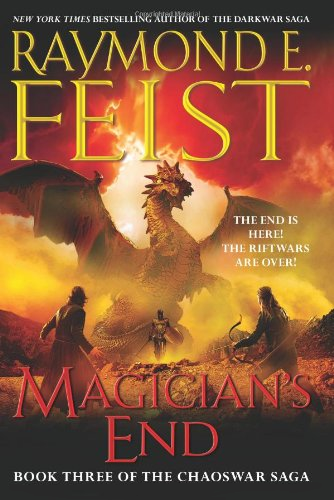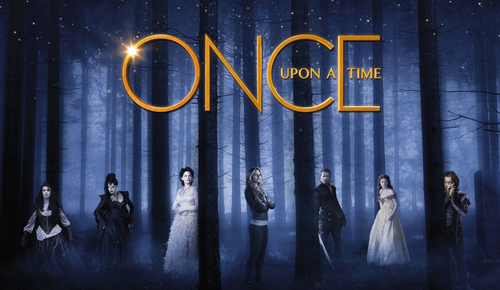Tyler F.M. Edwards's Blog, page 60
October 19, 2015
Rage of the Old Gods, Chapter Twenty-two: Something Higher
We’re now closing in on the end as we come to the twenty-second chapter of Rage of the Old Gods, the first book of my epic science fantasy trilogy the World Spectrum. In the coming weeks, I will be posting the entire book for free on this blog. If you’re just joining us, you can get caught up with the previous chapters now.
 As the Gods’ army nears humanity’s last bastion, the survivors turn to increasingly desperate measures in the hopes of preserving the species, but Leha refuses to abandon her principles. Will humanity’s continued existence come at the cost of its soul? Is surviving the current crisis worth dooming the future?
As the Gods’ army nears humanity’s last bastion, the survivors turn to increasingly desperate measures in the hopes of preserving the species, but Leha refuses to abandon her principles. Will humanity’s continued existence come at the cost of its soul? Is surviving the current crisis worth dooming the future?
———————
Chapter twenty-one: Something Higher
The lights danced before Yarnig’s eyes.
Since the battle by the ocean, he had put most of his time and energy into exploring his newfound magical abilities. It helped him keep his mind away from Natoma. Erik had originally urged him to go to Natoma and attempt to win her over, but Yarnig refused to go back on his word to her. He would wait until after the war – if it ever ended. Erik was fascinated by the new abilities he could access with Yarnig’s aid, so he soon forgot to meddle in the emperor’s personal life.
There were many magical abilities, such as Healing, that were so complex as to be out of reach of most wizards. Currently, they were working on another such magical art: illusion.
Most wizards had some ability to bend light – that was how scrying worked – but to create a three-dimensional, believable image of something was extremely difficult. And so they sat in front of Yarnig’s tent, in the hot summer sun, and tried to create images of things that weren’t there.
Yarnig held his hands before him and bit his lip in concentration. In his mind, he wove the strands of light together in a matrix so complex that even he had trouble maintaining it. In the air between him and Erik, the image of a long sword appeared and hovered above the ground. It was blurry, and it flickered oddly.
Yarnig furrowed his brow and forced the energies to cooperate. The image solidified into something indistinguishable from a real sword.
He relaxed slightly, and the image vanished.
Erik and Yarnig’s shoulders slumped in unison.
Sighing, Yarnig opted to take a break, and the ice creature helping them broke the link. Erik tossed him a flask of water, and Yarnig drank greedily of the cool liquid. The weather had been unusually hot lately, though the frequent rains provided moments of relief.
The sound of shovels in the dirt came to them from the outer edge of the camp.
“Maybe we should go back to carving things,” Erik suggested, his breathing heavy.
Yarnig had already shown talent in using magic to carve, shape, and craft items of exquisite detail, an artistic skill that Urannan wizards had been famous for. He had produced a collection of large, flat rocks bearing carvings every bit as intricate and detailed as his sketches had been.
He shook his head. “No, I think I need to keep at the illusion. We’ll get it right.”
Erik let out a breath. “Okay.”
After a few more minutes’ rest, they linked with each other again. Something simpler this time, Yarnig thought. They held out their hands, and a dim brown cloud coalesced between them. Yarnig frowned in concentration, and the cloud coalesced into a perfect replica of the water flask.
Yarnig breathed out slowly, trying to ease his tension without losing concentration. He and Erik decided to try for something harder. The flask dissolved, and in its place, a bottle of brandy, like the ones he had enjoyed at his country home, took its place.
Again, he made himself relax. The image stayed stable.
Yarnig’s brow furrowed in concentration, and the bottle dissolved to reshape itself into the image of the sword. This time, it didn’t vanish.
They experimented with moving the illusory sword, shifting it from vertical to horizontal and back again. Yarnig began to move the sword in a series of cuts and stabs.
The motion of the sword suddenly made him think of Natoma. He tried to push the thought out of his mind, and the image melted away.
He dropped his hands, swearing in his mind. He blushed brightly as he realized that the ice creature could sense his thoughts as well as Erik could.
I’m sorry, he sent to Erik as he tried to reorder his thoughts.
That’s all right, Erik thought, his reply tinged with hints of what he thought Yarnig should do about Natoma.
Yarnig ignored his friend’s opinions. They rested briefly as Yarnig refocused his attention, then returned to their work.
* * *
Near the northern edge of the camp, Leha sat upon a trebuchet and surveyed the camp. It would have been extremely difficult for a normal Barrian to reach her perch, but her enhanced agility had allowed her climb the massive engine easily, and her augmented reflexes allowed her to sit upon the timbers at the crown of its frame without fear of falling.
In the back of her mind, she felt the presence of one of Benefactor’s people. It had created a very minimal link between her and some members of the rearguard so that she could channel Tyzuan energy too them. It was the only way they could hope to reach the camp before the machines did. Leha had grown so used to doing it over the past few days that she barely noticed it. Only a slight, ever present feeling of fatigue reminded her of it.
The air was hot, but a cool wind blew from the mountains. A bank of clouds darkened the sky to the northeast and brought the smell of rain.
Her gaze swept the area. It was the fifth day after the battle by the ocean. In a short time, her people had made remarkable progress in preparing the camp. The clearing of trees was nearly complete, and, at the north end at least, the earthworks, war engines, and other defenses were finished.
When fully complete, the earthworks would encircle the camp in two concentric rings – they were but a pair of crescents at this point. Each ring would have four small gaps for people to move in and out. The gaps in the outer ring were aligned to the points of the compass, and those in the second ring were offset so as to ensure there was no straight, clear path into the camp. Each ring was slightly taller than an average Clan or Tor man, so they significantly outstripped Leha in height. An Automaton would be able to walk over or through them, but they would provide some protection from spells and airborne debris.
To the southwest, the defenses still needed much work. She saw people scurrying about, like ants, in a feverish attempt to prepare that section of the camp.
Just beyond them, smoke from the forges streamed into the sky as Drogin’s people worked to manufacture as much weaponry and armor as they could before the Automatons arrived. Leha had given the order that everyone in the camp was to be armed when the attack came, even those that would not be part of the defense. There was a good chance that the Automatons would breach the defenses and reach the civilians. If that happened, she didn’t want anyone to be without some means of defending themselves.
Limits on time and resources meant that many would be forced to make do with nothing but a few javelins of sharpened wood, but some would be lucky enough to receive crossbows or narviks. Some tools, such as pickaxes, could be used against the machines; those would be given out as well. Even Benefactor, whom she had begged to join the evacuation, and the other remaining ice creatures that weren’t wizards would be given crossbows.
As the days had progressed, the people of the camp had grown increasingly edgy. She saw the worry in their eyes, the fearful way they moved. Tempers had grown short, and arguments and disputes broke out often.
She couldn’t blame them. There was a good chance that the machines would kill them. Many of them had been separated from their families during the evacuation. And for the most part, there was nothing for them to do to make themselves feel useful or to take their mind off the impending attack. Aside from building the earthworks and doing other chores, all they could do was sit and hope Leha and her soldiers would be able to save them. She only wished she could have done better for them.
Her eyes turned back to the north slowly, taking in the camp as a whole. In comparison to the vast wilderness around it, the camp had always seemed tiny, a speck almost swallowed by the forest. But now she realized how large it was. It had housed many thousand people, and it was the size of a small city. It seemed like such a large area to defend.
To the north, a deep, wide trench had been cut in the barren fields. This was the source of the soil and stones the earthworks were made of. The trench was another obstacle the machines would have to avoid.
Farther north, she could see a line, cut by the River Sheen, through the endless trees and beyond that, the dark lump of Yeldar. They had considered moving the camp to the mountain and defending it, but it was too steep and rugged to be made habitable, or defendable, in the amount of time available. She wondered if the Automatons would destroy the First One outpost inside. She hoped they wouldn’t; if its secrets could ever be deciphered, it might have much to teach them.
She felt an ice creature touch her thoughts, but it was not the one connecting her to the retreating army. It was Benefactor. Leha, he said, sounding concerned.
What is it? she sent, wondering what had him so worried.
You must come to the command tent. You will not like it.
She frowned. She leapt off the edge of the trebuchet, cushioning her landing with the energy of Sy’om. Benefactor, what is it?
An image appeared in her mind: a large crowd outside the tent that had replaced the Clan hall as the main meeting area for her and the other leaders. Natoma stood before the crowd, attempting to keep order. Leha heard someone at the fore of throng say, “We want to see Leha. We want to be made like her.”
Her insides chilled, and she groaned. You’re right. I don’t like it.
She sensed Benefactor duck his head sadly.
She set off for the command tent at a steady jog, a damp wind from the northeast blowing at her back. She felt herself break out in a nervous sweat. She had feared something like this might happen. This time, she didn’t think people would be willing to accept her usual explanations about it being too risky. She hoped they would understand her true reasoning. She hoped she was doing the right thing.
Sensing her distress, Eranna and Doga’s minds became more present within the mental link. At the same time, they dismissed the other soldiers Leha had connected to so they wouldn’t sense her thoughts – the ice creature would, but they did not reveal information that their human allies considered private or privileged; for a people that kept no secrets among each other, they were fairly good at keeping those of others.
Leha wordlessly communicated the situation to Doga and Eranna. They sent her their sympathy, though they didn’t agree with her decision not to create more with her abilities. She thanked them.
We’ll break the link so you can concentrate fully, Eranna sent.
We should take a break soon anyway, Doga added.
Leha thanked them again. The link broke, and she felt a moment of relief as she stopped channeling energy to the army.
She arrived at the command tent. A crowd of about twenty people, mostly soldiers, had gathered before it. A few paces behind them, a much larger crowd had gathered and were chattering amongst each other.
Natoma stood in front of the tent, watching over the assembled people with a keen eye. She saw Leha approach and nodded to her. Leha came to stand beside her.
Before she could speak, a tall man – she recognized him as Karn, one of Eranna’s men – detached himself from the smaller group and bowed to her. “Leha, forgive our imposition,” he said, speaking accented Eastenholder. He straightened and gestured to the others in his little group. “We have come to volunteer ourselves. We wish to be changed, as you were.”
She started to speak, but he held up his hand. “We are aware of the risks. We know we could come to harm. But the machines will be here within days. We’ll need every advantage if we are to defend ourselves.” He looked at his comrades. “We’re willing to take our chances if it means we can make a difference.”
They nodded solemnly.
Leha felt her throat tighten. They really did believe in what they said. I hope I’m doing the right thing.
She swallowed, and spoke. “No. It won’t happen.”
Karn frowned, looking confused.
She pressed on, speaking loud enough for the larger crowd to hear. “I have always said that to transform others as I was would be very risky, and that’s true. The Lost One ability to change their venom is not an exact science, and the one who changed me is dead. We don’t know if we can replicate what was done to me.”
She stood tall, trying to appear more certain than she felt. “But that is not the only reason why I have forbid the creation of others like me.”
A murmur ran through the assembled people. Karn’s group exchanged glances.
“In the past, humanity has made many mistakes. We’ve launched pointless wars and committed atrocities against each other. We resurrected the Automatons and brought these current troubles upon ourselves.
“My abilities have the potential to be very destructive. I don’t think that I can trust anyone with that kind of power. I – ”
The crowd erupted. People yelled and booed and shouted. They shook their fists and made angry gestures.
Leha enhanced her voice and shouted to be heard over the tumult. “I wouldn’t trust myself with them, but I didn’t have any choice in the matter!”
Her words did nothing to stem the tide of screams and accusations. The larger crowd grew increasingly unruly, their voices pounding at her.
“Listen to me!” she shouted.
Natoma stepped forward. “She does this because she thinks it is right!” she said, her voice loud and commanding without seeming angry or belligerent. “We all owe our lives to her many times over! You should at least hear her out.”
The crowd quieted somewhat. Many of them seemed uncertain.
Leha felt a surge of gratitude for Natoma’s words. She took a breath and tried again to explain herself. “I understand your feelings. Really, I do. But I have to think about the consequences of this. And I worry what could happen if everyone had the abilities that I do.”
People in the larger group continued to grumble.
“Who are you to do decide that no one is worthy? Are you going to keep us inferior, under your power, like the Old Gods did?” a man yelled to her.
She flushed angrily. “I am nothing like the Old Gods! I don’t do this for me; I do this for the future! Can any of you promise me that no human will ever raise their hands against another again? Can you?” She scanned the throng, her eyes fierce.
She flexed her claws and took a moment to calm down. “I haven’t judged everyone unworthy. As you said, I’m not qualified. So who will judge who has earned it and who hasn’t? How can anyone’s judgment be good enough for them to decide who should wield this kind of power and who shouldn’t?”
The people stayed mostly silent, weighing her words. Some still mumbled to each other or threw her suspicious glances.
Not everyone in the camp had joined the initial gathering, and now others began to arrive to see what the commotion was.
A woman from Karn’s group, a Lost One, came forward and bowed her head. “I understand what you say,” she said. “I will respect your decision.”
Without another word, the Lost One left.
Leha nodded to her dumbly, taken aback by the suddenness of her decision.
“Why not simply give this power to everyone? Things would be equal. No one would have an advantage,” another man from the mob said.
Leha glared at him. “No one had an advantage when every nation had Automatons. That didn’t work out, did it?”
An angry rumble came from the masses.
Karn addressed her. “Leha, I understand your point of view,” he said respectfully. “But isn’t the time to play it safe past? The future is uncertain; right now, we know we need this. Once we’ve survived the machines, we can decide how to proceed.”
“No!” she said.
Natoma glanced at her quickly, seeming surprised at the strength of Leha’s emotions.
Leha shook her head and looked down, trying to rein in her anger.
She tilted her head back up and spoke to all assembled. “If you really disagree with me, if you really think it would be right to give more people these powers, prove me wrong. Stop seeking them! Prove that you can dedicate yourself to something higher than your own survival.
“Maybe there will come a time when I can trust people to wield this kind of power.”
She stared at the throng, her expression resolute, and those in the crowd, save for a few, stared back, appearing equally determined.
Eventually, it became clear to both sides that no resolution would be reached, and the people slowly returned to their lives and duties, continuing to grumble and look upon her with distrust. Their glances and harsh whispers sent an aching sadness through her. She had protected them for more than a year. She had risked her life and sacrificed, and now, it seemed to her, all their trust in her, all their gratitude for what she had done, had been washed away in just a few minutes.
Karn’s group started to dissipate not long after the larger crowd did, but Karn himself did not move. After a few minutes, Leha realized that he did not intend to leave.
“My decision is final, Karn,” she said tiredly, returning her voice to normal.
He stepped towards her. “I understand your point of view. I truly do,” he said. “But I think you need to be willing to accept that you may be wrong. You’re just one person. You can make mistakes. I ask you to reconsider.”
She shook her head. “You don’t understand. You can’t understand.” You don’t have the future of humanity on your shoulders.
He peered into her eyes. “Then make me understand. Get an ice creature to link our minds.”
Leha considered for a moment. “All right,” she said. “We’ll link.”
She closed her eyes and reached out to Benefactor. She conveyed what she needed.
She sensed him duck his head, and her mind began to link with Karn’s.
They started at the basic level of linkage that was normally used, where she sensed his assurance in his own rightness and his calm certainty, but then they progressed to a deeper, more profound link.
He saw her belief in her rightness, and the toll that having responsibility for the human race had taken on her. She, in turn, saw his belief that surviving in the here and now was more important than any undetermined future. She also saw that nothing in her mind surprised him.
Her jaw hung slack.
He did understand. And he still disagreed.
* * *
There were no more confrontations that day, but the air in the camp remained tense. Whenever Leha went somewhere, conversations would suddenly stop, or people would peer at her suspiciously, or they would avoid looking at her. Sometimes, they offered support for her decision, but those instances were rare.
The debate over whether she was doing the right thing seemed to send fractures through the people of the camp. She had trouble assessing things herself – most people no longer felt comfortable sharing their thoughts with her around – but many Lost Ones and the majority of Benefactor’s people agreed with her, and they funneled information to her.
From what her informants could tell, about half of the people in the camp were convinced she was wrong, and some of these were very vocal. Less than a fifth openly admitted to agreeing with her, though it was suggested that there were some who felt that way but would not say so. The rest were unsure of what stance to take. Many members of the camps for and against her decision had taken it upon themselves to convince others of their beliefs, and that led to a great deal of conflict. Arguments broke out all over the camp. Leha had heard raised voices herself on more than one occasion.
Thankfully, none of the confrontations had turned violent, and everyone was continuing to follow her orders and perform their duties – for now, at least. Things had spiraled out of control so quickly that Leha half-expected open mutiny soon.
Leha deeply regretted the timing of this. Eranna and Doga’s latest reports said that the machines would reach the camp within the next three days. Her people could not afford to be splintered like this so soon before a battle.
Her friends had put a great deal of effort into selling people on her policy. Natoma, especially, had been vocal in her defense of Leha. Leha was told that Drogin refused to let any of the forge workers or technicians speak ill of her while they worked. Even Doga and Eranna, who did not agree with her, had done their best to convince the rearguard – and via the link, those in the camp – that she should be supported for the sake of unity. Doga’s words had gone a long way towards building her support among the Lost Ones.
The efforts of the other leaders did a great deal to shore up support for her, but the camp remained divided. A hard knot of worry settled into Leha’s stomach and stayed there throughout the day.
That evening, as the sun dropped towards the peaks to the west and the heat of the day reduced to a more tolerable balminess, Drogin joined Leha outside her tent. Leha started a fire with wood that steamed from the afternoon rains, and they set a pot of soup over it. The soup was made from mushrooms from the forest and dried meat. It would barely feed the both of them.
They sat on stools to stay above the moist ground, and as they waited for their food to cook, they spoke of the events of the day. Leha would have preferred a more private location, but luckily few people were in the immediate vicinity. Only a few voices drifted from nearby tents.
She unloaded her worries and frustrations onto him, and he did his best to offer support.
“You’ll win them over,” he told her reassuringly. “You’re very good at persuading people.”
She nodded numbly and went on as if she hadn’t heard him.
As time went on, and their soup began to boil, they ran out of things to say, and the conversation died for a time.
“Maybe – maybe you should give in. Let the future be what it will be. Maybe you’re thinking too much; maybe this is too much for you to handle,” he suggested after a few minutes.
She frowned at him, feeling too tired to summon her earlier passion.
“For anyone to handle,” he added quickly.
He sighed and ran a hand through his sandy hair. “I just want to help. I wonder if all this planning and worrying for the future is too much. I understand why you want to keep these powers from spreading, but maybe it is best to do what’s right for the present and face the future when it comes.”
She nodded slowly. “I understand what you’re saying, and I appreciate it. But I have to stick to what I believe in.” She chewed her lip, thinking.
“You said that Tyzu changed me. Maybe you’re right; maybe some of that world’s savagery is now a part of me. But what the Lost Ones did to me imparted me with a piece of Sy’om, as well.
“Do you understand what a different perspective Benefactor’s people have, the way their world has shaped them? They don’t have war, or conflict. Sy’om will not permit it of them; they can only survive together. They think only of what is best for their race as a whole, over the long haul – and they remember their ancestors’ lives as their own, so their perspective of history is so much better than ours.”
She ran her fingers through her hair, mirroring his own use of the old family tic. “Ever since I came back from the other worlds the first time, I can’t bear the thought of our people being divided, of human warring against human again. I certainly won’t do anything that could let us do more harm to each other in the future. Bad enough that we must use weapons at all; my claws and my powers could be worse than an army of Automatons in the wrong hands. I’d sooner we all died now, together, as one people, than see a repeat of what happened to Three Gates.”
Her brother’s eyes were wide, and her cheeks burned as she realized she’d frightened him.
But he placed his hand on hers and said, “I understand.” And she knew he did.
She managed a shaky smile.
Drogin returned an equally fragile smile.
Their served their soup a short while later, and Leha ate it without tasting what little flavor it had.
She retired early, but she didn’t fall asleep for a very long time. She tossed and turned in her bedroll, mulling over the events of the day and trying to come up with some plan to resolve things. She couldn’t help but think of her conversations with Eranna and Lahune, of her mission to save humanity from itself. If they could not stay unified now, when the fate of three worlds depended on it, she didn’t know if they would ever be able to.
Despite her strong belief that she was doing the right thing, a part of her started to wonder if she had been wrong all along, and that part grew louder throughout the night. She had assumed that her way was the only right way, that anyone who understood the pressures on her would agree with it. But her link with Karn had proven that to be false. Now, she didn’t know what to think. Maybe it was unfair of her. Maybe people deserved access to power such as this. There was no guarantee that it would be abused.
Part of her echoed Drogin’s sentiments, saying that the answer was beyond someone such as her. Near midnight, she began to wonder if she should be bothering with any of her efforts to safeguard the future. Trying to bring lasting peace to the entire human race seemed far beyond a simple shopkeeper from Three Gates.
It wasn’t until well after midnight that exhaustion finally claimed her.
———————
Enjoying the story so far? The next chapter will be posted soon, but if you can’t wait, you also have the opportunity buy the full ebook now!
Filed under: My writing, World Spectrum Tagged: books, fantasy, Rage of the Old Gods free chapters, sci-fi, steampunk, The World Spectrum, writing








October 17, 2015
Defiance Cancelled
I’m way overdue to post a free chapter of Rage of the Old Gods, but some sad news has come up that I do want to cover briefly.
 I suppose the title of this post is something of a giveaway, but yes, Defiance has been cancelled after three seasons.
I suppose the title of this post is something of a giveaway, but yes, Defiance has been cancelled after three seasons.
It’s a disappointing piece of news, though not entirely a surprising one. Defiance was never a ratings juggernaut, and its viewership had dropped sharply with the third season. A lot of people criticized the show’s sudden turn toward the darker, so that may have contributed to its failing popularity. It also may have been the result of SyFy playing musical timeslots with it over the last few seasons.
Whatever the reason, Defiance is gone.
This saddens me, but perhaps not as much as you might think considering I’ve been a fan since the start.
The fact is that Defiance has struggled badly to maintain a consistent quality over the years. It had a very weak first season, a very strong second season, and a very mixed third season. I’m badly tempted to blame this on my own pet peeve and say the Omec killed the show, but there’s no way of knowing that.
What upsets me more than the loss of Defiance the show is the loss of Defiance the world. As up and down as the show was, the universe it took place in was fantastically detailed and endlessly fascinating. Defiance had a better eye for detail, a richer backstory, and a greater potential than almost any other setting I’ve ever seen.
 Now we’ll never know what the story with the Volge was, or why the Kaziri was on Earth so long ago, or what the cultures of the Sensoth and Liberata or like, or where the Gulanee fit into Votan society…
Now we’ll never know what the story with the Volge was, or why the Kaziri was on Earth so long ago, or what the cultures of the Sensoth and Liberata or like, or where the Gulanee fit into Votan society…
I will also greatly miss Datak Tarr and Doc Yewll.
Now, Defiance the game still exists, but it’s never been a huge hit, either, and without the show to prop it up, I suspect its days are now also numbered. I should probably make a point to spend time with it while I still can.
One could be optimistic and speculate that the story could continue through the game, with the show’s cast voicing their characters in-game as has already happened a few times, but I doubt the resources or willpower exists for that.
First Continuum, now Defiance. Well, it was nice to have a glut of sci-fi well it lasted.
At least there’s still Dark Matter.
Filed under: Misc. Tagged: Defiance, sci-fi, TV








October 14, 2015
WoW: The Curious Case of the Pandarian Nostalgia + Patch 6.2.3
It won’t seem that way to readers, but this post is in some ways the first after a long hiatus from blogging. Now, I have been doing my TV reviews, but those pretty much write themselves, and aside from them, I haven’t been written any new posts in months, instead relying on the backlog I gave myself while looking for apartments/moving.
 (Incidentally, I am very happy to be back in Toronto.)
(Incidentally, I am very happy to be back in Toronto.)
I wandered what my first new topic should be after such a long break, and I decided it would be best to go back to basics: a nice long ramble about Warcraft.
I’ve noticed something odd in the WoW community as of late. People everywhere seem overcome with nostalgia for Mists of Pandaria. An expansion that was loathed at the time is now being almost universally hailed as one of the best periods of the game’s long lifespan.
Some might not find this surprising. There’s a common perception that every WoW expansion is hated when it’s current, and then becomes viewed with rose-coloured glasses after the fact. I don’t like this argument, because it’s a bit of a cop-out and mainly serves to shut down discussion or deflect criticisms of the game, but there’s definitely some truth to it. The prevailing opinions on an expansion do tend to improve after it’s gone.
But never this thoroughly, or this fast. Warlords of Draenor is not yet a year old, yet already Mists is being roundly hailed as second only to Wrath of the Lich King, which is nowadays generally viewed as when the game peaked, despite being regarded as the Spawn of Satan for many years after its release.
I’m not immune, either. Lately I find myself missing Pandaria, badly. I still have my hearthstones set the shrines, and sometimes I’ll fly out across the Vale, or up to Kun-Lai and just be overcome by nostalgia. The other day I hopped on my monk (who is still 90 because I’m sick of Draenor) and did some scenarios purely for the nostalgia value.
 But yet none of these good feelings were to be found when MoP was the current content. It faced at least as much disdain from the supremely negative WoW community as any other expansion, if not more, and I was certainly none too happy with the state of the game at the time, as long-time readers will remember.
But yet none of these good feelings were to be found when MoP was the current content. It faced at least as much disdain from the supremely negative WoW community as any other expansion, if not more, and I was certainly none too happy with the state of the game at the time, as long-time readers will remember.
So what happened?
The wonders of Pandaria:
In my case, I actually saw this coming somewhat, though I didn’t expect my turnaround on MoP to happen this soon or be this dramatic. But I did often have the sense that I’d feel a lot better about Mists of Pandaria after the fact.
See, I had a lot of complaints about MoP, but they were all gameplay related. The daily grind, the tedium of Timeless Isle, the devaluing of valor and justice points.
Yet the content of the expansion, its story, and its setting were stellar. As I’ve always said, Mists of Pandaria kind of sucked, but Pandaria was amazing.
 As time goes on, I forget the unpleasant gameplay, and all that’s left is a fantastic story.
As time goes on, I forget the unpleasant gameplay, and all that’s left is a fantastic story.
Make no mistake, for all its myriad flaws, Pandaria was a fantastic adventure from beginning to end. It was probably the best told story in WoW’s history. Not best overall — I’d still give that to Wrath, but it has the advantage of more interesting subject matter — but best executed.
MoP, more than any other expansion, told a cohesive story, with each event flowing into the next organically. The Thunder King was kind of an odd detour, but aside from that, the entire story from the discovery of Pandaria to the Siege of Orgrimmar was one big arc that spanned the entirety of Azeroth and the full spectrum of human emotion — rage and sorrow, hope and joy, humour and tranquility. Its pacing and its flow were impeccable.
The world-building was also excellent in MoP. Blizzard essentially started from scratch with Pandaria, but they created an incredibly intricate and exotic world full of new cultures and history that still managed to fit perfectly into the greater Warcraft mythos.
All this is exactly the sort of thing that earns my love, so perhaps it’s not surprising I now miss Pandaria as much as I do. But most people don’t care about story as much as me, which leads me to wonder why there’s so much nostalgia for MoP throughout the community.
One could write it off as being blinded by nostalgia, and there’s bound to be at least some of that going around, but I don’t think that’s all.
Compare and contrast:
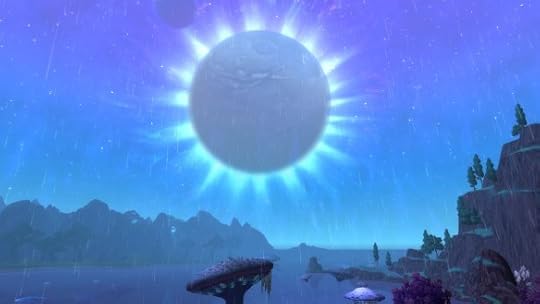 Ultimately I think this sudden wave of panda-love may have less to do with MoP itself, and more to do with Warlords of Draenor.
Ultimately I think this sudden wave of panda-love may have less to do with MoP itself, and more to do with Warlords of Draenor.
Warlords of Draenor is, by a wide margin, the smallest expansion World of Warcraft has ever received. By comparison, MoP was enormous.
Say what you about MoP, but the one thing you could never say about it was that it lacked ambition. It offered a huge selection of new features, and it cranked out four major content patches over its lifecycle. I’ve heard some describe MoP as “the golden age of content,” and there’s definitely a lot of truth to that, as it offered content in copious quantity and (mostly) high quality — though it does lose points for the lack of post-launch dungeons.
By comparison, WoD offered only one new feature, garrisons, and only one content patch. Tanaan Jungle was originally slated to be a launch zone and was delayed, so really WoD’s only post launch content additions were a single raid and the garrison shipyard. And let’s not forget that WoD removed a lot from the game, too, to the point where the game has probably been made worse by it — something that has not been true of any other expansion to date, in my opinion.
The difference in scale and ambition between Mists of Pandaria and Warlords of Draenor is cavernous. In light of that, it’s no wonder that MoP is suddenly being viewed much more highly.
 I suspect if WoD had been a larger and more successful expansion, we would not be seeing the sudden outpouring of love for MoP that’s happening. MoP probably still would have ended up being viewed much more positively, but I think it would have taken much longer, and I’m not sure the change in opinion would ever have been so complete.
I suspect if WoD had been a larger and more successful expansion, we would not be seeing the sudden outpouring of love for MoP that’s happening. MoP probably still would have ended up being viewed much more positively, but I think it would have taken much longer, and I’m not sure the change in opinion would ever have been so complete.
Although I am cautiously optimistic about Legion right now (emphasis on “cautiously”), it’s still looking a bit anemic compared to past expansions, and one has to wonder if Mists of Pandaria was the last great World of Warcraft expansion — in terms of scope and ambition, if not necessarily quality.
There are those who say that the worst thing about Cataclysm was that it followed Wrath of the Lich King. I think the best thing about Mists of Pandaria may have been that it preceded Warlords of Draenor.
* * *
Patch 6.2.3: The mea culpa:
Of course, just as I’m getting ready to put up this post, Blizzard has a big announcement to make. WoW will soon receive a small content patch, 6.2.3, to tide us over during the (undoubtedly lengthy) wait until Legion, and it’s looking to be the best patch of the expansion to date.
Valor is back.
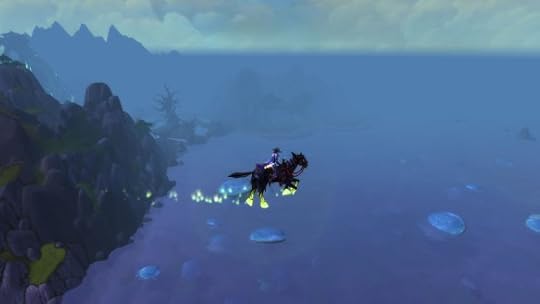 Holy Hell, did not see that coming.
Holy Hell, did not see that coming.
I really thought valor points were dead and gone. Rare indeed is the time when Blizzard reverses one of their decisions after so long.
Valor will only be used for item upgrades, not buying gear, which isn’t ideal, but it’s a start. The game needs valor. It was the best progression system for non-raiders, and it allowed all content to still have some relevance. Dungeons were pretty much killed by the removal of valor points.
For my part, I have no patience for RNG gearing, and apexis crystals were/are an excruciating grind with mostly underwhelming rewards. Valor was my endgame, and without it, WoD has nothing but a legendary quest and garrison chores to me.
Unfortunately I’m already super burned out on Draenor, and there are a lot of other games I need to find time to play, so I’m not sure how much difference this will make for me, but it’s a step in the right direction. It shows me Blizzard is willing to learn from their mistakes. For the first time since WoD was announced, I feel a little of my faith renewed.
 I can only hope they realize what a huge mistake they’ve made and that valor is a launch feature for Legion.
I can only hope they realize what a huge mistake they’ve made and that valor is a launch feature for Legion.
There are some other nice things in 6.2.3, too. Timewalking is being expanded to include some Cataclysm dungeons, as well as some more Wrath and Burning Crusade dungeons, and timewalking bosses will now have a chance to drop an Infinite Drake mount. Shockingly, it’s not just the old Infinite drake model, but a totally new (and awesome) model.
Perhaps even more surprising is that the upcoming Grove Warden moose mount is going to be made temporarily available as a drop from heroic Archimonde.
A store mount available for free? This is unprecedented. I might even overcome my distaste for raiding and get a kill in, because flying moose.
I mean, I am Canadian.
It’s hard not to see 6.2.3 as a giant mea culpa from Blizzard for how much they’ve bungled Warlords of Draenor, but frankly, they needed to do that. I’m glad they’re swallowing their pride and trying to make it right.
Filed under: Games Tagged: fantasy, Warcraft, World of Warcraft








October 11, 2015
Review: Continuum, “Final Hour” (Series Finale)
And so we come to the end. After just six episodes, the fourth season of Continuum has concluded, and with it one of the best science fiction television series of recent memory — perhaps of all time.
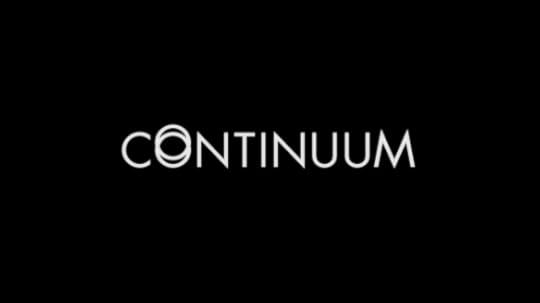 The stage is set for a final showdown at the warehouse where Kellogg’s future soldiers are planning to open a portal to their own time. The Vancouver Police Department, led by Carlos and (surprisingly) Dillon, alongside Piron’s security forces plan to crush them in a pincers movement, while Kiera and Alec attempt to infiltrate the facility in the hopes of sending Kiera home.
The stage is set for a final showdown at the warehouse where Kellogg’s future soldiers are planning to open a portal to their own time. The Vancouver Police Department, led by Carlos and (surprisingly) Dillon, alongside Piron’s security forces plan to crush them in a pincers movement, while Kiera and Alec attempt to infiltrate the facility in the hopes of sending Kiera home.
Meanwhile, Kellogg plans yet another double cross, and along the way proves himself even more gross than we thought.
Considering all the build-up around this epic final clash and Continuum’s penchant for frequent and spectacular fight scenes, “Final Hour” isn’t as action-packed as you might expect. Oh, there’s more than a few bullets and explosions, but there’s also quite a lot of time given to tearful farewells and waxing philosophical about the implications of time travel.
To be honest, it felt like a case of telling and not showing. The entire series has been a thesis on the personal and ethical implications of time travel. We didn’t need any more.
And as much as it pains me to say it, that’s not the only way “Final Hour” didn’t quite meet my expectations. It’s an episode that seems filled with missed opportunities.
The Traveler’s storyline, for instance, doesn’t ultimately amount to much, and honestly I don’t understand its resolution at all.
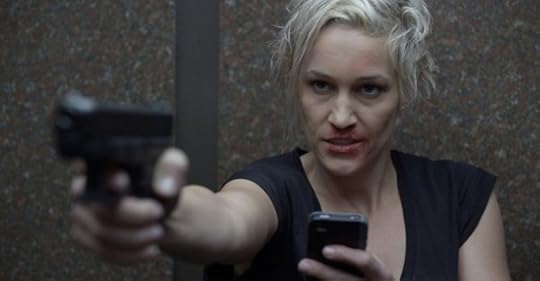 Similarly, Garza is just sort of there and doesn’t really do anything. This is very disappointing, because Garza is awesome, and I spent the whole episode expecting her to do something crazy and throw everything into chaos.
Similarly, Garza is just sort of there and doesn’t really do anything. This is very disappointing, because Garza is awesome, and I spent the whole episode expecting her to do something crazy and throw everything into chaos.
The list goes on. I would have liked to have seen Emily be involved somehow. Her plot was just sort of left hanging. I want to know what Jason wrote in that note.
I don’t like how things wound up with Brad, either. It doesn’t feel right after his ruthless backstabbing in the last episode.
There were some high notes, though.
I actually rather liked Dillon getting some redemption in the end. At first I thought it was too sudden and didn’t fit with his character, but thinking about it, it makes sense from a thematic perspective.
Dillon was always a kind of metaphor for the trajectory of the world. As time went on, he became more and more corrupt, a forebear of the totalitarianism of Kiera’s time. Having him break free of that darkness is a good way to illustrate the changing course of the timeline. He’s a microcosm of the entire arc of Continuum.
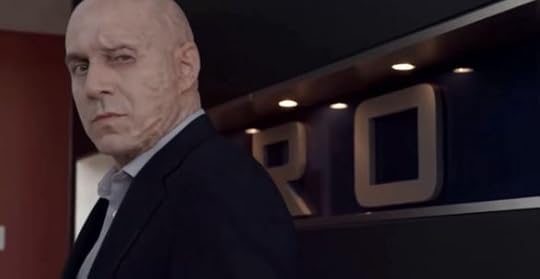 And I did truly love the very end. It was powerful, emotional, and incredibly satisfying, if rather bittersweet. I’m very glad they found a way to provide a positive outcome without giving Kiera a perfect shiny happy ending. Very well done.
And I did truly love the very end. It was powerful, emotional, and incredibly satisfying, if rather bittersweet. I’m very glad they found a way to provide a positive outcome without giving Kiera a perfect shiny happy ending. Very well done.
So in the end, “Final Hour” wasn’t all I was hoping for from the conclusion of Continuum, but it wasn’t exactly bad, either, and I’ve certainly seen far more disastrous ends to sci-fi shows. I’m looking at you, Battlestar Galactica.
For all its faults, “Final Hour” cannot tarnish the incredible legacy of Continuum, and it serves as an effective, if uneven, conclusion to the truly brilliant arc of the series. When you consider where the show started, and how much the characters and the mythos grew and evolved in that time, it’s awe-inspiring.
Overall rating: 7.5/10
I’m sad to see Continuum end, but I am very grateful that it had the chance to end on its own terms, and that we were able to see such an incredible story come to its conclusion.
Farewell, Continuum. You were a shining example of science fiction at its very best.
Filed under: Reviews Tagged: Continuum, review, sci-fi, TV








October 8, 2015
Review: The War Against the Assholes
Have you ever thought to yourself, “Gee, you know what would make a great story? Harry Potter crossed with the movie Snatch.”
 I’m guessing probably not. Unless you’re author Sam Munson, in which case you’ve not only had that thought (or something similar) but written and published it as a book.
I’m guessing probably not. Unless you’re author Sam Munson, in which case you’ve not only had that thought (or something similar) but written and published it as a book.
And yes, the title really is The War Against the Assholes.
It’s one part teen drama, one part black comedy, one part gang war, one part urban fantasy, and one part… I don’t even know.
The story follows Michael Wood, a jockish teenager attending a fancy Catholic school in New York. An encounter with a strange boy named Hob ushers Michael into a gang of rogue magicians.
They live in defiance of the secret magical hierarchy that has reigned over the world for centuries. These individuals are properly referred to them as theurgists, but Hob refers to them as assholes, and the name sort of sticks. To be fair, it’s not an inaccurate descriptive.
Above I compared The War Against the Assholes to Harry Potter, and there is definitely a resemblance. There is a lot of teen drama and coming of age themes here, albeit presented in a deliberately crude and often borderline twisted manner. The conflict between Michael’s gang and the “assholes” also sometimes seemed to amount to a contest between rival high schools, albeit a deadly one.
So basically Harry Potter with much more sex, drugs, booze, and violence.
It also reminded me of the Black Company novels in some ways. There’s that same deadpan, sardonic mannerism to the writing, the same twisted sense of humour.
As the Black Company comparison might imply, the prose is one of the strong points of The War Against the Assholes. Yet it’s also a weakness.
Specifically, the dialogue is handled in an unusual manner, and it’s quite disruptive. Instead of each line being its own paragraph, or spaced out any other way, the dialogue is just jammed into the middle of paragraphs, with lines from different characters coming back to back often with inadequate clues as to who’s saying what. It’s very confusing, and it gets tiresome.
 I suspect this was a conscious decision on the author’s part. The book is told in first person perspective, and Mike is, by his own admission, not terribly bright. But intentionally writing the book poorly in some ways, while an admirable effort towards verisimilitude, still does more harm than good.
I suspect this was a conscious decision on the author’s part. The book is told in first person perspective, and Mike is, by his own admission, not terribly bright. But intentionally writing the book poorly in some ways, while an admirable effort towards verisimilitude, still does more harm than good.
Since we’re on the subject, Mike just isn’t that compelling of a character. He’s ultimately little more than slow-witted thug, and his main virtues as a member of the magical revolution is that he is both very capable of and very willing to hurt people when the situation calls for it.
By far the biggest flaw of The War Against the Assholes is that its main character is also its least interesting character by a wide margin. I would have much preferred a book from the perspective of, say, Hob, or Alabama the gun-toting sorceress.
There are some other issues, too. The story flows oddly, with the most climactic events happening about halfway through and the story just sort of slowly petering out after that. The ending is also quite underwhelming and doesn’t provide closure to much of anything. Normally I’d say this is just leaving room for a sequel, and admittedly that remains the most likely scenario, but the whole of the book is just so odd I wouldn’t be shocked if it turns out that really is it.
That said, the book still has many strengths. It’s funny, it keeps you guessing, it’s extremely original, and aside from the dialogue issue, the prose is very clever and a joy to read.
Something else that impressed is that despite the book’s irreverent attitude and real world setting it still manages to evoke the sense of awe and wondrous beauty that lies at the heart of the fantasy genre. I can’t call out specifics without getting into spoiler territory, but there are scenes in this book that left me genuinely awestruck.
The War Against the Assholes is not a book that I would recommend to everyone. Its graphic subject matter and relentless oddness would definitely turn off more than a few people. But I enjoyed it, and it deserves major credit for being different.
Overall rating: 7.7/10 Abracadabra, bitches.
Filed under: Reviews Tagged: books, fantasy, review








October 5, 2015
Review: Continuum, “The Desperate Hours”
One of the most interesting and underutilized types of plot, in my opinion, is having a protagonist’s plans fail.
 I don’t mean just a setback. I mean an utter, spectacular, catastrophic failure. To have all of their carefully laid schemes come crashing down around them.
I don’t mean just a setback. I mean an utter, spectacular, catastrophic failure. To have all of their carefully laid schemes come crashing down around them.
As Continuum’s second to last episode begins, Kiera has developed a risky but complete plan to end the threat presented by Kellogg’s future soldiers and get home to her own time. Alec has done the math, and it should work. She just has to rely on Brad and Kellogg holding up their ends of the bargain.
Maybe it’s not surprising that placing her faith in such people doesn’t end well.
Failure is definitely the theme of this episode. Failure of plans, of efforts, of aspiration. But also personal failure, as well. Failure of the characters to be their better selves.
I was so disappointed by the actions of several characters in this episode. Just craven, selfish, irresponsible behaviour all around.
The really ironic thing is that the people who came out of this mess looking the most heroic are Travis and Dillon, which almost makes you wonder if this is Opposite Day. But really it just shows how far the others have fallen.
 To be fair, Alec and Carlos still managed to stay true to their principles, for the most part.
To be fair, Alec and Carlos still managed to stay true to their principles, for the most part.
I’m not complaining. All of these actions made sense in the context of the characters’ various arcs, it made for good drama, and one of the things I like about Continuum is that it’s a very morally gray show. Often, the “good guys” are no better than the people they oppose.
At this point, though, at least one character has definitely crossed the Rubicon, and I can only look forward to their inevitable (hopefully grizzly) demise.
Another major theme of “The Desperate Hours” is once again throwing doubt on whether Kiera can get home, or if the timeline she came from even still exists in any form.
I’m quite glad of this. It never made much sense to me that Kiera could take her home’s preservation for granted when much of last season was devoted to making clear that her timeline was gone, and her letting go of it. Admittedly, Continuum’s rules regarding time travel are not terribly well explained, but Brad’s very existence seems to show that Kiera’s home is long gone.
 I will also say again that I hope Kiera does not ultimately make it home. It would waste a lot of the character development she’s gone through to do date, it wouldn’t make much logical sense, and honestly I don’t think Kiera deserves a perfect shiny happy ending.
I will also say again that I hope Kiera does not ultimately make it home. It would waste a lot of the character development she’s gone through to do date, it wouldn’t make much logical sense, and honestly I don’t think Kiera deserves a perfect shiny happy ending.
Kiera isn’t a very good person. She’s not a monster, but she’s no hero, either — and “The Desperate Hours” proves that quite conclusively. I don’t necessarily want to see Kiera suffer, but I don’t want her to get everything she wants, either.
She just doesn’t deserve it.
My one significant complaint with this episode would be that we see nothing of Curtis or the Traveler, and considering how important they theoretically are and how close we are to the end, I was expecting them to have a role to play.
Overall rating: 8.1/10
Filed under: Reviews Tagged: Continuum, review, sci-fi, TV








October 2, 2015
Review: The Chaoswar Saga, Book Three: Magician’s End
The cover for Magician’s End declares it to be the final book in Raymond E. Feist’s Riftwar Cycle, the very last book set in Midkemia. This came as rather a surprise to me — this series has basically been going forever, and I didn’t really expect there to ever be an end.
September 29, 2015
Review: Continuum: “Zero Hour”
“Zero Hour” is also the title of one of my favourite Star Trek episodes.
 This “Zero Hour” isn’t quite as good as that “Zero Hour,” but it’s still another strong showing from Continuum.
This “Zero Hour” isn’t quite as good as that “Zero Hour,” but it’s still another strong showing from Continuum.
Eschewing the pulse-pounding action of the last few episodes, “Zero Hour” focuses more on big reveals and evolving the characters’ relationships.
Kiera and Brad’s trust is frayed almost to the breaking point following the death of Lucas, and as evidence mounts that his comrades from the future are planning something terrible, their time as allies might be coming to an end.
Alec, meanwhile, is torn with doubt. He’s terrified that every choice he makes could spawn a new dark future. When the fate of the world, of time itself, rests on your shoulders, how can you ever be sure of anything? Is the future written, or can it be changed, and if so, should it?
As he struggles with these issues, Jason reveals what he already told Emily: that Emily was not his mother. Over Jason’s objections, Alec insists on tracking down and meeting the woman his future self married.
 What follows is history’s weirdest — and for Jason, most awkward — family reunion ever. Adds a little levity to what has otherwise been a pretty grim season.
What follows is history’s weirdest — and for Jason, most awkward — family reunion ever. Adds a little levity to what has otherwise been a pretty grim season.
In the end, though, meeting the mother of his son does little to dispel Alec’s doubts. Aid, instead, comes from an unexpected source: Curtis.
Kellogg is burdened with doubts. With the minions of his future self still refusing to offer any answers, he must take matters into his own hands, and he comes to discover there is no one Mathew Kellogg won’t screw over — not even Mathew Kellogg.
Although “Zero Hour” lacked anything that would fit the traditional definition of action, I still found it quite exciting, and the hour flew by.
We got a lot of important revelations in this episode, and it went a long way towards both setting the stage for Continuum’s conclusion and fleshing out the backstory of the series to date. Many questions have been answered.
Also, dat paradox.
 I also greatly enjoyed Alec’s arc. In the end, it’s always been about him, and his agonizing over the consequences of his choices gets to the very heart of what Continuum is about.
I also greatly enjoyed Alec’s arc. In the end, it’s always been about him, and his agonizing over the consequences of his choices gets to the very heart of what Continuum is about.
This is, I think, one of the best things about speculative fiction: the ability to take something we all identify with, and turn it up to eleven.
We’ve all doubted ourselves. We’ve all worried that our choices might prove wrong, that our plans might fail, that we may come to ruin despite our best efforts. How much worse, then, to have the weight of all space-time on your shoulders? To know that the future of the human race is in your hands, and that you already failed once?
Fantastic.
Kellogg’s humbling was also great to see. One wonders if there’s anyone left willing to save him. He’s been pretty good at burning his bridges.
My one complaint about this episode — and season four in general, really — is that I’m not digging the continued tension between Kiera and Brad. It feels like a waste of all their development from last season, and it’s all getting a bit soap opera for my taste.
 My weird random thought of the night: I wonder who does the cooking for these big dinners with Kiera, Alec, and Liber8? I can’t see Alec being much of a cook. Kiera’s probably used to robots doing all her cooking, or something. Julian probably only knows how to make gluten-free crap. I’m not sure Jason is allowed near sharp things.
My weird random thought of the night: I wonder who does the cooking for these big dinners with Kiera, Alec, and Liber8? I can’t see Alec being much of a cook. Kiera’s probably used to robots doing all her cooking, or something. Julian probably only knows how to make gluten-free crap. I’m not sure Jason is allowed near sharp things.
Maybe Garza? Wasn’t she running a restaurant at some point?
Anyway.
Overall rating: 7.8/10
Filed under: Reviews Tagged: Continuum, review, sci-fi, TV








Review: Continuum: Zero Hour
“Zero Hour” is also the title of one of my favourite Star Trek episodes.
 This “Zero Hour” isn’t quite as good as that “Zero Hour,” but it’s still another strong showing from Continuum.
This “Zero Hour” isn’t quite as good as that “Zero Hour,” but it’s still another strong showing from Continuum.
Eschewing the pulse-pounding action of the last few episodes, “Zero Hour” focuses more on big reveals and evolving the characters’ relationships.
Kiera and Brad’s trust is frayed almost to the breaking point following the death of Lucas, and as evidence mounts that his comrades from the future are planning something terrible, their time as allies might be coming to an end.
Alec, meanwhile, is torn with doubt. He’s terrified that every choice he makes could spawn a new dark future. When the fate of the world, of time itself, rests on your shoulders, how can you ever be sure of anything? Is the future written, or can it be changed, and if so, should it?
As he struggles with these issues, Jason reveals what he already told Emily: that Emily was not his mother. Over Jason’s objections, Alec insists on tracking down and meeting the woman his future self married.
 What follows is history’s weirdest — and for Jason, most awkward — family reunion ever. Adds a little levity to what has otherwise been a pretty grim season.
What follows is history’s weirdest — and for Jason, most awkward — family reunion ever. Adds a little levity to what has otherwise been a pretty grim season.
In the end, though, meeting the mother of his son does little to dispel Alec’s doubts. Aid, instead, comes from an unexpected source: Curtis.
Kellogg is burdened with doubts. With the minions of his future self still refusing to offer any answers, he must take matters into his own hands, and he comes to discover there is no one Mathew Kellogg won’t screw over — not even Mathew Kellogg.
Although “Zero Hour” lacked anything that would fit the traditional definition of action, I still found it quite exciting, and the hour flew by.
We got a lot of important revelations in this episode, and it went a long way towards both setting the stage for Continuum’s conclusion and fleshing out the backstory of the series to date. Many questions have been answered.
Also, dat paradox.
 I also greatly enjoyed Alec’s arc. In the end, it’s always been about him, and his agonizing over the consequences of his choices gets to the very heart of what Continuum is about.
I also greatly enjoyed Alec’s arc. In the end, it’s always been about him, and his agonizing over the consequences of his choices gets to the very heart of what Continuum is about.
This is, I think, one of the best things about speculative fiction: the ability to take something we all identify with, and turn it up to eleven.
We’ve all doubted ourselves. We’ve all worried that our choices might prove wrong, that our plans might fail, that we may come to ruin despite our best efforts. How much worse, then, to have the weight of all space-time on your shoulders? To know that the future of the human race is in your hands, and that you already failed once?
Fantastic.
Kellogg’s humbling was also great to see. One wonders if there’s anyone left willing to save him. He’s been pretty good at burning his bridges.
My one complaint about this episode — and season four in general, really — is that I’m not digging the continued tension between Kiera and Brad. It feels like a waste of all their development from last season, and it’s all getting a bit soap opera for my taste.
 My weird random thought of the night: I wonder who does the cooking for these big dinners with Kiera, Alec, and Liber8? I can’t see Alec being much of a cook. Kiera’s probably used to robots doing all her cooking, or something. Julian probably only knows how to make gluten-free crap. I’m not sure Jason is allowed near sharp things.
My weird random thought of the night: I wonder who does the cooking for these big dinners with Kiera, Alec, and Liber8? I can’t see Alec being much of a cook. Kiera’s probably used to robots doing all her cooking, or something. Julian probably only knows how to make gluten-free crap. I’m not sure Jason is allowed near sharp things.
Maybe Garza? Wasn’t she running a restaurant at some point?
Anyway.
Overall rating: 7.8/10
Filed under: Reviews Tagged: Continuum, review, sci-fi, TV








September 26, 2015
Retro Review, Once Upon a Time, Season Three: Episodes 7-12
Continuing on my Once Upon a Time binge watch, I run into a patch of almost entirely good episodes after a long run of rambling inconsistency.
After half a dozen episodes set exclusively in Neverland (bar flashbacks, anyway), we return to Storybrook as Ariel and Belle work to recover the artifact Rumpel needs to defeat Peter Pan. But Pan’s agents are on their trail.
Back in Neverland, Baelfire, Hook, and Emma set out to capture Pan’s shadow, hoping to use it to escape Neverland, and must battle dark magic and a whole lot of social awkwardness in the process.
I liked Belle and Ariel’s story mainly because I like Belle, and any time she gets to play the hero, I’m happy. That said, it was all a bit too quick and easy.
It’s also a bit hard to accept that a bookish woman in heals and a ditzy mermaid who doesn’t know what a shirt button is could defeat two armed, century-old agents of one of the multiverse’s most powerful magical beings through sheer brute force and determination.
It’s not that I don’t think Belle could beat those two, but it would have felt better if she’d done so using her own special knowledge and skills, as she did when she assisted Mulan and Philip.
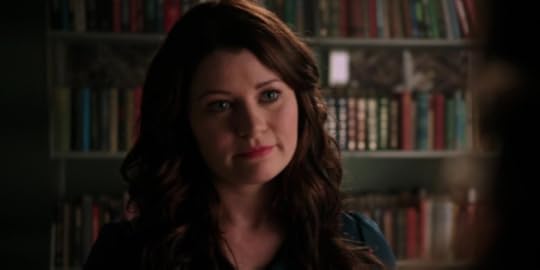 Still, more Belle is better than less Belle, so it’s still a win on the whole.
Still, more Belle is better than less Belle, so it’s still a win on the whole.
Emma’s plot also had potential, but was too bogged down by the love triangle between her, Baelfire, and Hook.
Man, if I could ban one story-telling device, it would be love triangles. They are so overused and utterly tiresome. I’m sure someone out there finds this kind of story appealing, but I can’t for the life of me find any value of them. Add to that the fact that one third of the triangle is someone I don’t care about at all (Emma), another is someone I find only marginally less irrelevant (Baelfire), and the third is someone I dearly want to see fall into industrial machinery (Hook), and just… ugh. Make it stop.
But hey, at least there was Belle.
Overall rating: 7/10
“Think Lovely Thoughts”:
Once Upon a Time has odd pacing. Here we are in the middle of a season, and yet this episode has the kind of epic scale, drama, and major revelations you normally only see in season finales.
Pan has reached the endgame. He plans to sacrifice Henry to achieve ultimate power, but Emma, Rumpel, Regina, and company are hot on his trail.
 Meanwhile, a series of flashbacks delves into Rumpelstitlskin’s childhood, his first encounter with Neverland, and the true nature of Peter Pan.
Meanwhile, a series of flashbacks delves into Rumpelstitlskin’s childhood, his first encounter with Neverland, and the true nature of Peter Pan.
At the risk of being cliche, there was nary a dull moment in this episode. There was plenty of action and suspense, and some very good twists and revelations.
I liked the actor they got to play Rumpel’s father, too. You could see a real resemblance between him and the adult Rumpel in terms of mannerisms — similar laugh, too.
My only complaint is that it’s a bit hard to believe Henry was foolish enough to fall for Pan’s lies. Henry is usually shown to be smarter than that.
Overall rating: 8.1/10
“Save Henry”:
You’ll never guess what they’re trying to do in this episode.
…
All right, sorry.
 So, yes, the race is on to save Henry before Pan can fully absorb the power of his heart, gaining unlimited power at the cost of Henry’s life.
So, yes, the race is on to save Henry before Pan can fully absorb the power of his heart, gaining unlimited power at the cost of Henry’s life.
No one is more determined than Regina, and for once, her ruthlessness might just save everyone.
Our flashbacks this time chronicle Regina’s adoption of Henry and the early days of their life together. It’s not really that interesting a story, and it didn’t tell me anything I didn’t already surmise — Regina was kind of cold as a mother but came to love him — but Lana Parilla puts on a very strong performance, so that makes it worthwhile.
As is often the case with Once Upon a Time, this episode doesn’t quite live up to the epic expectations set by the last episode, but it’s still mostly enjoyable.
I continue to be impressed with Pan as a villain. Not only is he incredibly cruel and genuinely frightening, but he’s also fiercely clever and persistent. Every time you think he’s lost, it turns out he’s still two steps ahead.
Overall rating: 7.3/10
“The New Neverland”:
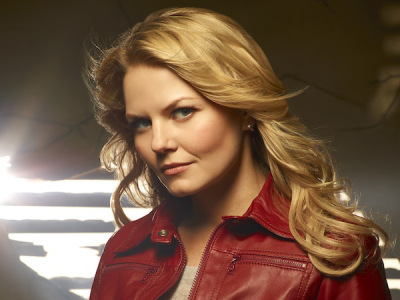 By the relatively modest standards of Once Upon a Time, this is an intense season so far.
By the relatively modest standards of Once Upon a Time, this is an intense season so far.
Emma and company have returned to Storybrook, and joyful reunions abound. But Emma is not content. She can’t shake the feeling that this isn’t her happily ever after, that something terrible is imminent.
Emma’s anxiety is well-founded. Pan, within Henry’s body, wastes no time in enacting his plan to control Storybrook and turn it into a new Neverland. Emma has her suspicions, but by the time she can prove anything, it may be too late.
Meanwhile, the flashbacks this time are a fairly random tale of Snow and Charming facing down the Medusa in an ill-conceived attempt to gain a weapon for use against Regina.
This is another episode that feels more like a season finale than anything, complete with nail-biting cliff-hanger. Once again, Pan proves himself two steps ahead of our heroes.
The death of the Blue Fairy is quite shocking, though with the abundance of magic she could always return. I somewhat hope so; she’s certainly a grave loss for Storybrook. Unless Tinkerbell gets her act together, she’s the only practitioner of light magic to be found.
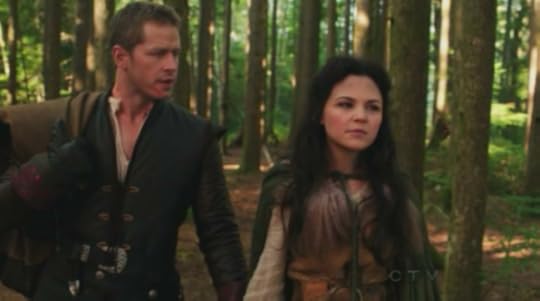 However, the flashbacks feel like a waste of time. They’re not that interesting, they offer no illumination on current events, and their message of living in the moment feels completely out of place considering Emma turns out to be entirely right to be worried. If she’d taken her parents’ advice, Henry would still be stuck in Pandora’s box.
However, the flashbacks feel like a waste of time. They’re not that interesting, they offer no illumination on current events, and their message of living in the moment feels completely out of place considering Emma turns out to be entirely right to be worried. If she’d taken her parents’ advice, Henry would still be stuck in Pandora’s box.
More and more I’m thinking Once Upon a Time’s traditional flashbacks have become a burden rather than an asset. They used to be my favourite part of the show, but now they just feel like distractions from the important stuff.
Best line of the series to date for Charming: “You think I’m interested in Hook? Emma, I’m a married man!”
Stupid thing that shouldn’t bother me but does: This was not accurate to the true Medusa myth.
Overall rating: 7.5/10
“Going Home”:
The best villains have a few things in common. They’re despicable, they’re powerful, and they require tremendous sacrifices in order to defeat.
 All of these things are true of Peter Pan. “Going Home” focuses on the last ditch effort of the people of Storybrook to prevent Pan’s curse, which will render them all his slaves in a new Neverland. Even if they succeed, many will lose everything in the process.
All of these things are true of Peter Pan. “Going Home” focuses on the last ditch effort of the people of Storybrook to prevent Pan’s curse, which will render them all his slaves in a new Neverland. Even if they succeed, many will lose everything in the process.
This episode once again shows Pan to be epitome of cruelty and ruthless self interest, and illustrates that his centuries of life have allowed him to plan ahead for nearly every eventuality.
Yet in the end the most memorable thing about this episode is not Pan, but what has to be sacrificed to stop his plans, even after he’s no longer a threat. Stellar performances from Regina, Rumpel, and Belle make for an incredibly powerful episode.
This is another episode that could have worked well as a season finale, or even a series finale. But to some extent this episode’s strength is also its weakness. It’s a spectacular, beautifully bittersweet ending… but it’s still an ending.
Yet the show isn’t over. We don’t even need to skip ahead to the next episode to see proof of that. Undoubtedly the status quo — or something resembling it — will return before long. I suspect even Rumpel’s death will likely prove as temporary as the Blue Fairy’s.
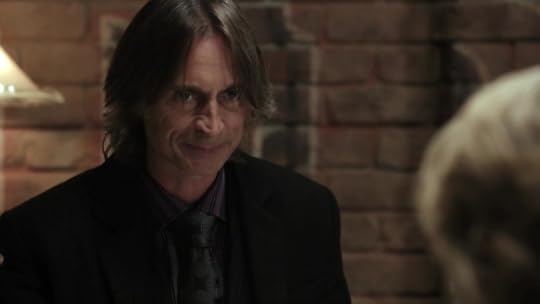 That rather sucks the impact out of what is otherwise an absolutely stellar episode.
That rather sucks the impact out of what is otherwise an absolutely stellar episode.
Overall rating: 7.9/10
“New York City Serenade”:
Wouldn’t it have been wonderful if they had used this opportunity to shift the focus entirely to the Enchanted Forest, so we’d never have to see Emma again?
I had that thought before watching this episode, so it’s not a commentary on it, but nonetheless, “New York City Serenade” is a good illustration of why the series would be better off without Emma.
Once again, the story is split between worlds and times: a forgetful Emma beset by Hook in the now, and the former residents of Storybrook trying to build a new life for themselves in the Enchanted Forest a year ago.
The Enchanted Forest plot is great. We’ve got Regina tearing out her own heart to deal with the pain of losing Henry, Belle and Baelfire plotting to bring back Rumpelstiltskin, and the mystery of a new dark power in the Forest.
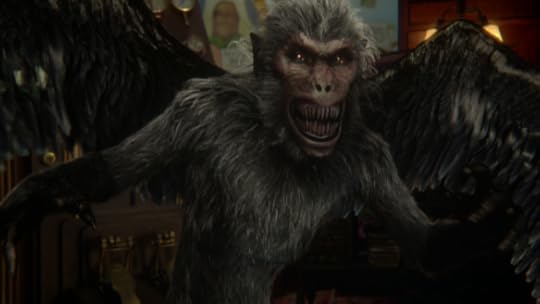 Though admittedly the flying monkeys are a bit of a dead giveaway. Can’t say I’m thrilled with the idea of bringing in the Wizard of Oz — that’s a bit too modern for my taste. At the very least, they should have spent a few episodes dealing with the aftermath of recent events before adding a new threat.
Though admittedly the flying monkeys are a bit of a dead giveaway. Can’t say I’m thrilled with the idea of bringing in the Wizard of Oz — that’s a bit too modern for my taste. At the very least, they should have spent a few episodes dealing with the aftermath of recent events before adding a new threat.
Kudos for making something as ridiculous as flying monkeys actually scary, though.
Also, Baelfire looks surprisingly dapper in fantasy clothes. In real world garb, he looks like a hobo who recently won the lottery, but put him in a tunic and cape and suddenly he looks heroic. I don’t get it.
On the other hand, Emma’s side of the story is just bad. No other way to put it. It’s little more than a retread of the first season in miniature. It’s full of Hook stank. Too much time wasted on Emma’s new boyfriend. And Emma just isn’t interesting enough to carry a story like this. Three seasons in, and her acting is still flat as day-old soda.
Also, dem plot holes. After more than a year, no else took Baelfire’s apartment? The cops didn’t search Hook when they arrested him?
The best part of the plot was seeing Emma and Henry play Diablo III. The fact that Emma plays a wizard is my favourite thing about her to date.
Overall rating: 7/10
Filed under: Retro Reviews Tagged: fantasy, Once Upon a Time, review, TV









